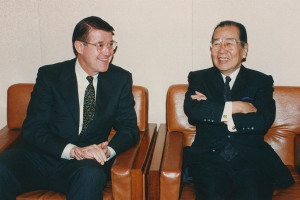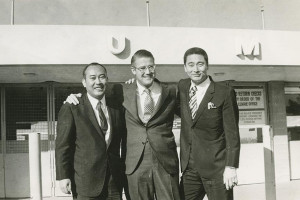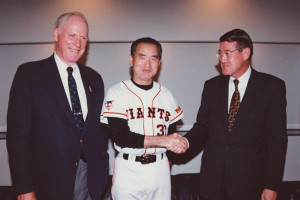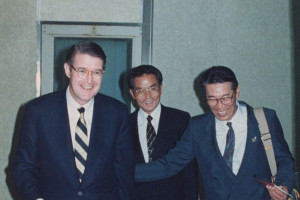The Decades Long Friendship of O’Malley Family and Japan
For more than 65 years, the O’Malley family and Japan have enjoyed the friendliest of relationships, mainly conjoined through the universal sport of baseball. It took vision, nurturing and investment, but both sides and their fans reaped the fruits of those seeds sown in the mid-1950’s during the reconstruction of post-war Japan.
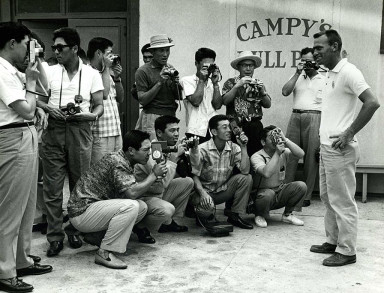
Dodger outfielder Wally Moon greets members of the Tokyo Yomiuri Giants at Dodgertown, Vero Beach, Florida in front of an area called “Campy’s Bull Pen” for Hall of Fame catcher Roy Campanella. The Giants spent their 1961 Spring Training at the Dodgers’ base and would later win the 1961 Japan Series championship.
The strong ties that bind included significant cultural exchanges with Japan Baseball Commissioners, League presidents, owners, executives, players, umpires, medical personnel, professional and amateur teams. Working agreements were formed, advancing knowledge to observers and providing coaches and players an opportunity to gain first-hand experiences. Professional and college teams were invited to stay and play at Dodgertown, Vero Beach, Florida, the all-inclusive Spring Training home of the Dodgers, training alongside the major leaguers. These included the Tokyo Yomiuri Giants five times and the Chunichi Dragons of Nagoya once. It was the perfect location to foster togetherness, friendships and exchange ideas. The Dodgers traveled to Japan on three occasions: 1956, 1966 and 1993 to play professional teams and All-Stars. Special arrangements were made welcoming young players from Japan to the U.S. minor leagues to learn fundamentals, receive personal instruction and compete for a season, while several former Dodgers reciprocated by playing in Nippon Professional Baseball.
Countless international meetings and phone calls were made with Japan baseball leaders in an effort to structure a unified plan to gain support from other countries and advocate baseball’s inclusion as a gold medal sport in the Olympic Games. In 1980, the Dodgers premiered Mitsubishi Diamond Vision, installing the world’s largest, full-color video board at Dodger Stadium in Los Angeles, altering forever the presentation of in-game entertainment.
Along the way, friendships for a lifetime were formed. First, under the leadership of Dodger President Walter O’Malley and then continuing with his son, Peter, whose passion for helping baseball to grow and thrive worldwide has been evident for decades.
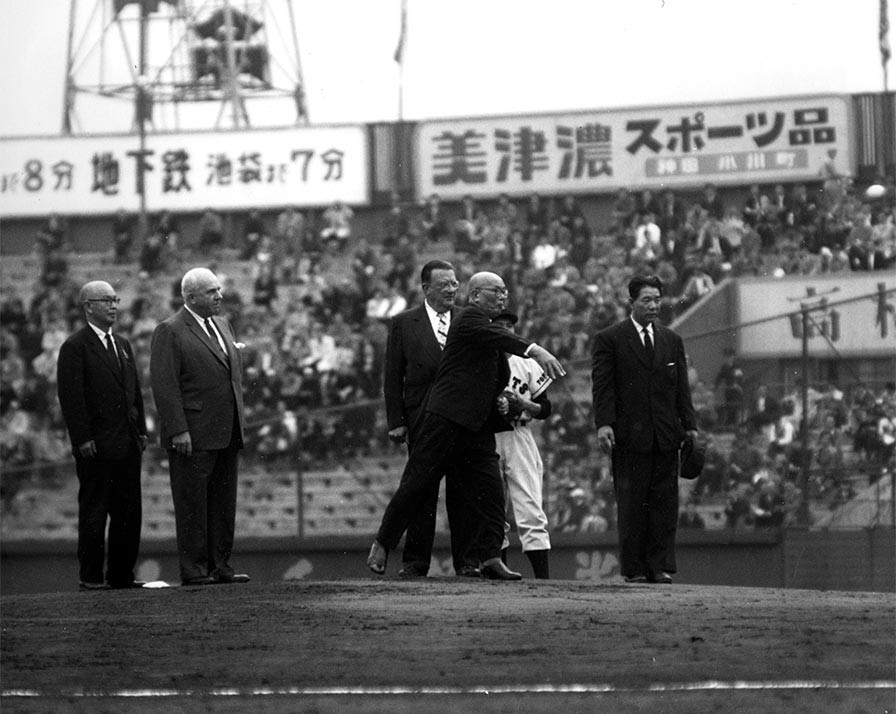
Matsutaro Shoriki, owner of the Tokyo Yomiuri Giants and sponsor of the Dodgers 1956 Goodwill Tour, throws the ceremonial first pitch to launch the tour festivities on October 19, 1956. (L-R) Sports columnist Sotaro Suzuki, National League President Warren Giles, Dodger President Walter O’Malley, and unidentified stand behind Shoriki at Korakuen Stadium, Tokyo.
Matsutaro Shoriki, the “father of professional baseball in Japan,” invited the Dodgers to play a month-long series of exhibition games in the fall of 1956 against the team he owned, the Tokyo Yomiuri Giants, and All-Star teams formed from the professional leagues. Shoriki believed that countries could be unified through baseball. The 1956 Goodwill Tour to Japan had a profound effect on the O’Malley family, all of whom made the first visit. Peter enjoyed traveling with his parents – Walter and Kay – and sister Terry during the tour and experiencing all that Japan had to offer.
He witnessed the curiosity of the knowledgeable fans in Japan, their enthusiasm and appreciation to see such all-time great Dodgers as Jackie Robinson, Pee Wee Reese, Duke Snider, Roy Campanella, Don Newcombe, Gil Hodges, Carl Erskine and many more. Broadcaster Vin Scully traveled with the team and was Peter O’Malley’s roommate during the trip. O’Malley took countless photos of the tour. It began his lifelong interest in international baseball through friendships.
“I’m a firm believer in baseball bridging cultures and bringing countries together,” Peter O’Malley, who has made approximately 85 visits to Japan, told the Mainichi Daily News.
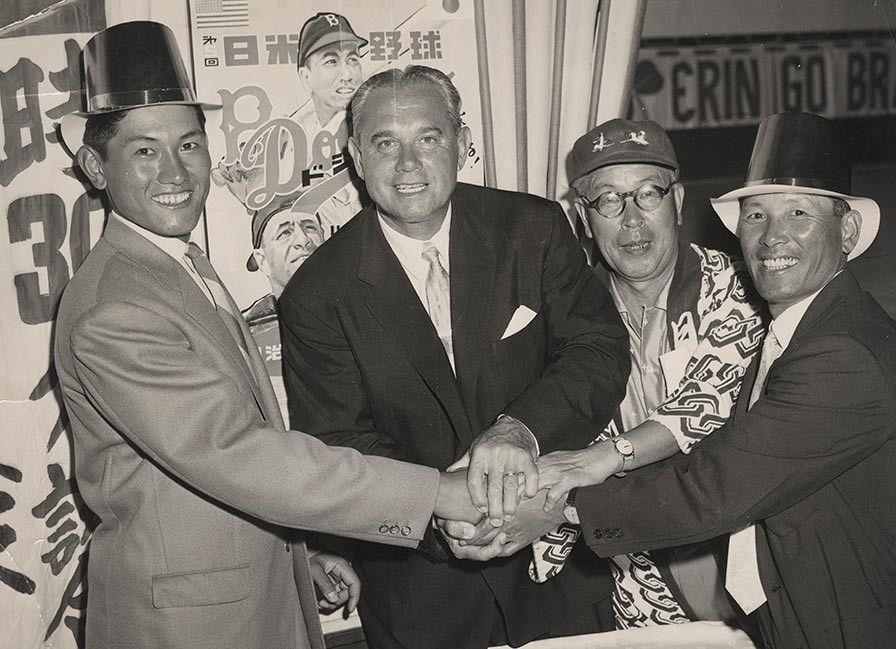
L-R: Sho Horiuchi, pitcher of the Tokyo Yomiuri Giants; Dodger Vice President Fresco Thompson; Sotaro Suzuki, highly-respected sports columnist; and Shigeru Mizuhara, manager of the Tokyo Yomiuri Giants.
The quartet stands in front of the Dodgers 1956 Goodwill Tour to Japan poster at the March 17, 1957 St. Patrick’s Day party at the Recreation Building at Dodgertown, Vero Beach, Florida. Horiuchi and teammate Shigeru Fujio were guests of the Dodgers during Spring Training, along with Manager Mizuhara and Suzuki. Mizuhara and Suzuki were both inducted into the Japan Baseball Hall of Fame.
Sixty years later, that trip inspired the Wall Street Journal to write this headline, “Sixty Years Ago, the Dodgers Toured Japan and Changed Baseball Forever”. The article details how friendships were formed by the O’Malley family and Japan baseball leaders from the Dodgers’ 1956 goodwill trip throughout Japan. Those bonds continued and expanded, leading to Tokyo Yomiuri Giants trips to Dodgertown for spring training to learn the “Dodger Way”; the Dodgers’ 1966 Goodwill Tour to Japan; 1993 Friendship Series in Fukuoka; and the 1995 signing of Hideo Nomo.
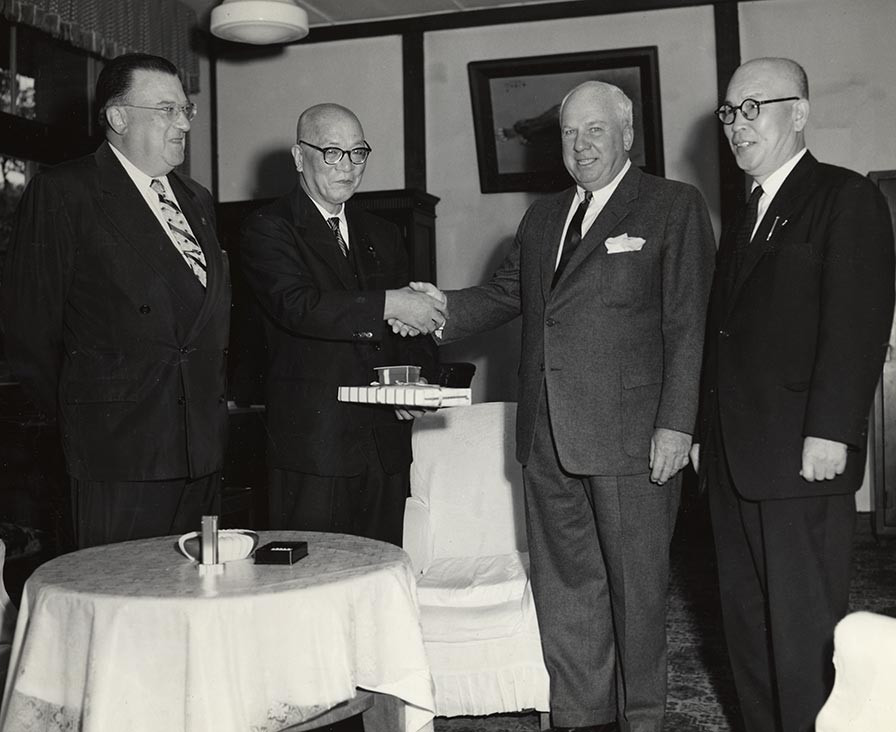
(L-R): Dodger President Walter O’Malley; Tokyo Yomiuri Giants owner Matsutaro Shoriki; National League President Warren Giles; and renowned Yomiuri sports columnist Sotaro Suzuki exchange gifts during the 1956 Dodgers Goodwill Tour to Japan. The tour was sponsored by Yomiuri Shimbun newspaper.
In 1965, on the recommendation of Sotaro Suzuki, highly-respected confidant to Shoriki who was enshrined in the Japan Baseball Hall of Fame, the Dodgers hired Japan-born Akihiro “Ike” Ikuhara, who wanted to learn the intricacies of a baseball front office. Ikuhara played college baseball at Waseda University, Tokyo and later was head baseball coach at Asia University. He assisted Peter O’Malley for two years in Spokane, Washington at the Dodgers’ Triple-A farm team, helped to coordinate the Dodgers 1966 Goodwill Tour to Japan, before working at Dodger Stadium in all departments.
Ikuhara became a trusted friend of Peter’s and was named Assistant to the President in 1982. He was an interpreter for many important meetings and helped O’Malley to fulfill his pursuit of international relations, and longtime efforts to make baseball an official sport in the Olympic Games. Ikuhara passed on October 26, 1992. He is the only USA Major League Baseball executive in the Japan Baseball Hall of Fame, posthumously elected on January 11, 2002. In honor of Ikuhara, Peter O’Malley sponsored and developed a sports management class with Waseda University and held a series of lectures there from 2003-2009.
The O’Malley family welcomed players, owners and team officials to Dodger Stadium, Dodgertown and in their homes. They traveled together, shared vision and gained mutual trust and respect. Extraordinary gifts were exchanged in deep appreciation for the longtime relationship. The O’Malley family visited Japan and went to the home of Suzuki. He was a guest of Kay and Walter O’Malley for the Grand Opening of Dodger Stadium in 1962 and, in gratitude, sent an impressive eight-foot Kasuga stone lantern to O’Malley asking that it be displayed so fans might enjoy it as part of a traditional Japanese garden on property and an expression of goodwill.
In 1995, the Dodgers’ international search for top talent struck new heights when Hideo Nomo was signed as a free agent. He captured the attention of the baseball world through “Nomomania”, revitalizing and elevating Major League Baseball following a prolonged players’ strike. From Los Angeles to Tokyo, Nomo captivated the baseball world with each of his starts televised live no matter what hour in Japan. His triumph as a pioneer set the example and opened the door for more than 65 Japan-born players (through the 2023 season) to participate in MLB.
While he and his father were honored on June 11, 1996 at the Japanese American Cultural and Community Center dinner in Los Angeles, O’Malley said: “The potential for baseball both as an international sport and vehicle for goodwill is extraordinary and those of us involved in baseball must seize the opportunity and bring the people of the world closer together through this sport. That is my mission.”
For their years of helping Japan advance baseball through friendship, both Walter and Peter O’Malley received decorations bestowed from two Emperors with highest honors from the government.
Shigeo Nagashima, known as “Mr. Japanese Baseball,” for his Hall of Fame career as a player and manager of the Tokyo Yomiuri Giants, said: “Peter O’Malley’s contribution has never stayed only in the United States. He has done the best for baseball to become an international sport. Peter O’Malley gave all his effort to strengthen the relationship to Japan.”
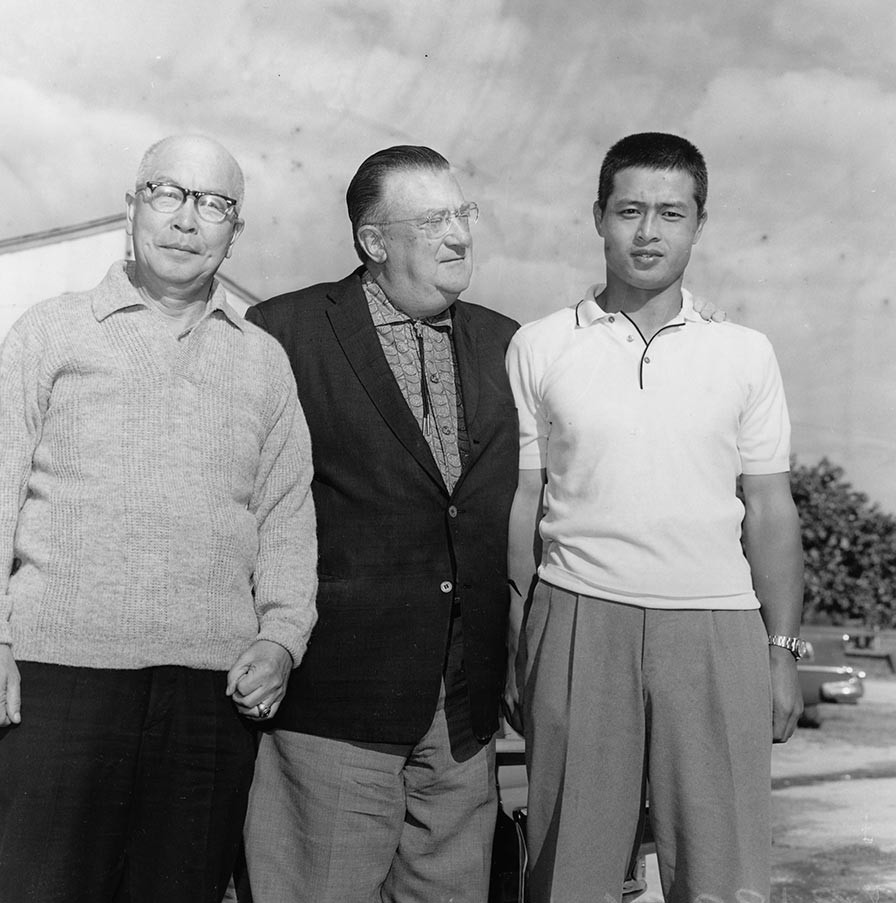
Walter O’Malley welcomes Japan’s famous sports columnist Sotaro Suzuki (left) and Tokyo Yomiuri Giants star Sadaharu Oh to Dodgertown, Vero Beach, Florida in 1961 Spring Training.
Courtesy of University of Southern California, on behalf of the USC Specialized Libraries and Archival Collections
Japan Baseball Hall of Famer and all-time international home run king Sadaharu Oh said in 2015: “The O’Malley family taught us thoroughly and patiently like we are your family and your passion raised the level of Japanese baseball. Japanese baseball owes you greatly…I hope that you continue to work for further development of baseball.”
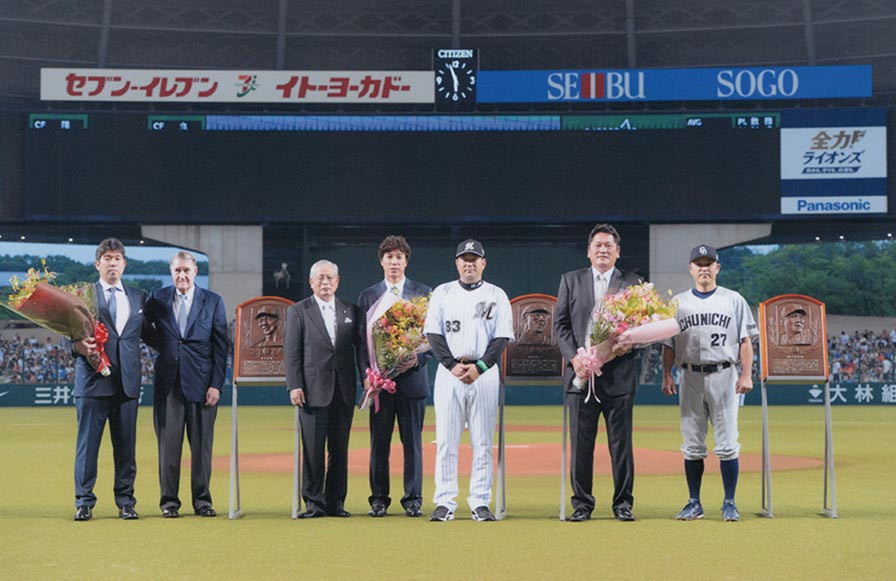
Hideo Nomo and Peter O’Malley are on the far left for pregame ceremonies inducting Nomo into the Japan Baseball Hall of Fame at Tokorozawa, Japan, July 18, 2014, prior to the Nippon Professional Baseball All-Star Game at Seibu Dome.
L-R: Hideo Nomo, Peter O’Malley, Katsuhiko Kumagai, Chairman of the Japan Baseball Hall of Fame and Museum; inductee Koji Akiyama, who played for Seibu and Fukuoka and managed Softbank; Tsutomu Ito, who played, coached and managed Seibu; inductee Kazuhiro Sasaki, who played for Yokohama and the MLB Seattle Mariners; and Motonobu Tanishige, star player for Yokohama and Chunichi.
Nomo said of his friend Peter O’Malley with whom they share mutual respect: “I understand his great contribution to Japanese baseball over many decades. With his support and hard work to Japanese baseball, I wouldn’t be here.”


